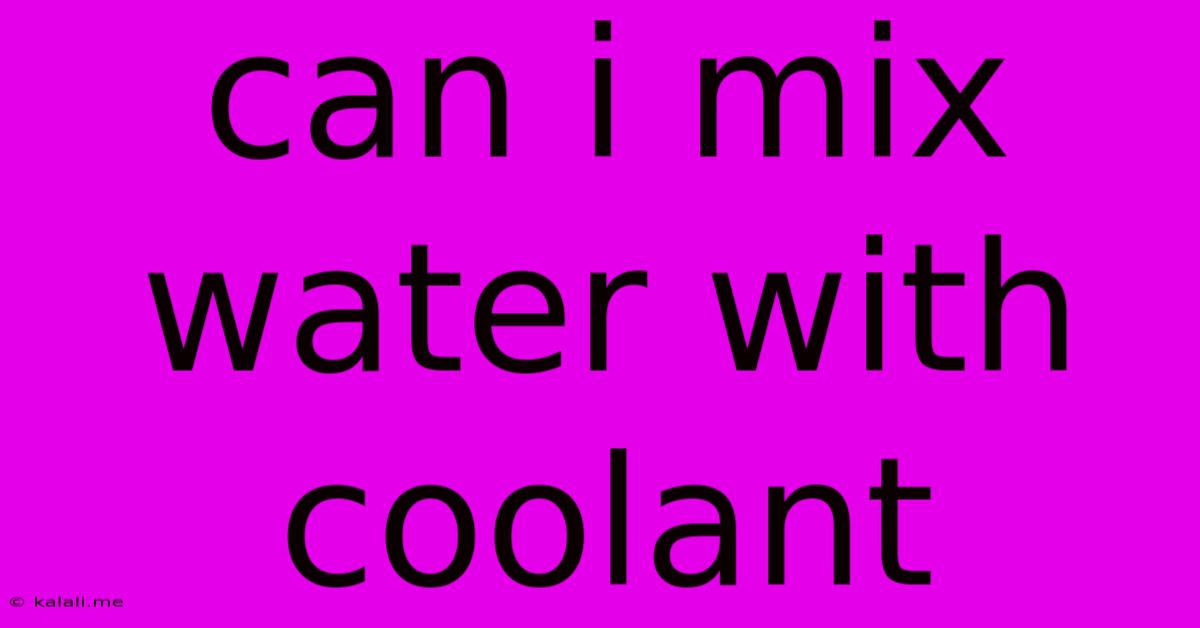Can I Mix Water With Coolant
Kalali
May 21, 2025 · 3 min read

Table of Contents
Can I Mix Water with Coolant? A Comprehensive Guide
Mixing water with coolant is a common question among car owners, especially during emergencies or when topping off the cooling system. While it's tempting to simply add water when your coolant level is low, understanding the implications is crucial for maintaining your vehicle's engine health and longevity. This article will explore the risks and benefits of mixing water with coolant, providing you with the knowledge to make informed decisions.
Understanding the Role of Coolant
Before delving into the mixing question, let's establish the crucial role coolant plays. Coolant, also known as antifreeze, is a vital component of your vehicle's cooling system. It's a mixture of water and antifreeze chemicals (typically ethylene glycol or propylene glycol) designed to:
- Prevent overheating: Coolant absorbs heat from the engine, preventing it from reaching damaging temperatures.
- Protect against freezing: The antifreeze component lowers the freezing point of the mixture, protecting the engine from damage in cold climates.
- Prevent corrosion: Coolant contains corrosion inhibitors that protect metal components in the cooling system from rust and degradation.
- Lubricate water pump: The coolant helps lubricate the water pump's seals, ensuring smooth operation.
The Risks of Mixing Water with Coolant
While adding water in an emergency might seem harmless, regularly mixing water with coolant can lead to several problems:
- Reduced effectiveness of antifreeze: Diluting the coolant with water reduces its ability to protect against freezing and overheating. This significantly increases the risk of engine damage in extreme temperatures.
- Corrosion: Water can accelerate corrosion within the cooling system, damaging components like the radiator, engine block, and hoses. This can lead to costly repairs down the line.
- Cavitation: If the coolant mixture becomes too diluted, it can lead to cavitation within the water pump. Cavitation occurs when the coolant boils, forming vapor bubbles that damage the pump impellers.
- Scale buildup: Over time, minerals in the water can deposit and create scale buildup within the cooling system, reducing efficiency and potentially leading to blockages.
- Reduced heat transfer: A diluted coolant mixture is less efficient at transferring heat away from the engine, increasing the risk of overheating.
When is Mixing Water with Coolant Acceptable?
There are very limited circumstances where mixing water with coolant is acceptable:
- Absolute emergency: If you're stranded with a critically low coolant level and have no access to the correct coolant type, adding clean water is better than letting the engine overheat. However, this should be considered a temporary measure only. Replace the diluted coolant as soon as possible.
- Topping off with distilled water: Using distilled or deionized water to slightly top off the coolant level is generally less harmful than using tap water due to the absence of minerals. However, it is still best practice to use the correct coolant mix.
Best Practices for Coolant Management:
- Regularly check coolant levels: Inspect your coolant level at least once a month or before long trips.
- Use the correct coolant type: Consult your vehicle's owner's manual to determine the recommended coolant type and mixture.
- Avoid mixing different coolants: Mixing different types of coolant can lead to chemical reactions, rendering the mixture ineffective and potentially causing damage.
- Flush and replace coolant periodically: Following your manufacturer’s recommendation for coolant replacement is vital for maintaining optimal cooling system performance. This usually involves completely draining the old coolant and refilling with fresh coolant of the correct type and concentration.
Conclusion:
While mixing water with coolant might seem like a quick fix in some situations, it's generally not recommended. The risks associated with reduced protection against freezing and overheating, increased corrosion, and other potential problems significantly outweigh any short-term convenience. Sticking to the manufacturer's recommended coolant type and regularly maintaining your cooling system is crucial for ensuring your engine's longevity and preventing costly repairs. Always prioritize using the correct coolant for your vehicle's cooling system.
Latest Posts
Latest Posts
-
Disconnectedcallback In Lwc Remove The Data
May 23, 2025
-
How To Excf To Clean A Linux Ext4 Partition
May 23, 2025
-
Taylor Series Of Sinx Centered At 1
May 23, 2025
-
Water Based Polyurethane Over Oil Based Stain
May 23, 2025
-
Will An Airline Hire A 43 Year Old Pilot
May 23, 2025
Related Post
Thank you for visiting our website which covers about Can I Mix Water With Coolant . We hope the information provided has been useful to you. Feel free to contact us if you have any questions or need further assistance. See you next time and don't miss to bookmark.